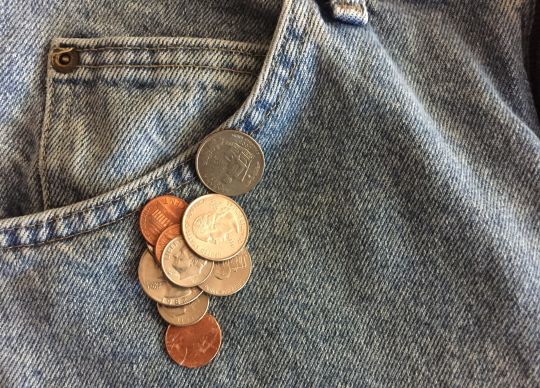A Career Transition on Pocket Change
by William S. Frank, President/CEO of CareerLab®

OUTPLACEMENT is the business of helping people losing their jobs to be re-employed. Sometimes it’s done one-on-one, sometimes in groups. I’ve done onesie-twosies and worked in 5,000-person layoffs.
This time I was running a year-long downsizing for an aerospace manufacturer. My client who was just laid off, an electrical engineer in his 50s, walked in the door on crutches. Recovering from hip replacement surgery, he could barely hobble.
Kennard was shocked and saddened by the loss of his job, and to complicate the situation, his wife was dying of cancer. This was a very bad day for both of us.
My job as an outplacement consultant is to stabilize people and get them pointed forward. And I always paint the picture of a brighter future.
We met in my office for several planning sessions. It was obvious that an electrical engineer in aerospace is marketable in a similar job. Kennard was not looking to become an architect or make a major career shift.
I often ask clients about their financial situation, not to be nosy, but to understand their staying power in the job market. I don’t need to know dollars, but the length of their runway. Can they last one month, six months, or a year? It makes a difference in how we plan the campaign.
I will never forget the money question with Kennard. I asked him how he was doing financially and how long he could stay in the job market.
He said, “I’m down to pocket change.”
“You mean you have no savings?”
“That’s right.”
“Why, what’s happened?”
“My wife has cancer and we’ve spent our life savings
on her treatment. The situation has destroyed
our marriage and we’re divorcing.”
I was stunned. For years I had helped people leave companies, and this was the worst story I’d heard. For the first time in my career, I thought about taking out my checkbook and writing Kennard a check.
Instead, I asked about family resources, and he said family members would help. I told Kennard I was very sorry for him, and gave my best version of “the future will be better.” This view was based on the fact that Kennard was very well liked. He was a helper and giver, one of those people you can count on in a time of need. He was a collaborator and friend-maker. This bode well for the future.
As I’ve often said, by the time a job candidate gets to me, 90% of their marketing has already been done. They have a history and a reputation. They’ve been accomplishment-oriented doers and achievers, or C-students, or worse. They’ve built bridges at work or burned them. They’re well-liked or loved, or else disliked and maybe hated. This history is center-stage in a career transition.
We set about updating Kennard’s resume and creating a letter to his friends and acquaintances. The letter clearly explained his situation (absent the cancer and divorce) and told exactly what he was looking for.
As he mailed the letters, I provided moral support. My role in this transition was counselor.
Very quickly, Kennard’s friends jumped in, made introductions, and opened doors. That led to specific opportunities. He interviewed and did well. Within a few weeks he received a job offer: same salary, same industry, same pay.
There was additional good news. Kennard said that his wife’s cancer was in remission, they had reconciled, and she was relocating with him to California.
This was a happy ending to a sad story. You can’t make this stuff up.